|
|
| |
| EVENTS |
|
|
> Legislators should give policy for development rather getting funds. Senator Jan Jamali
|
|
|
|
| |
Islamabad; September 22: Senator Jan Muhammad Khan Jamali, Deputy Chairman, Senate of Pakistan, said that Parliamentarians should give policy for development instead of getting funds for Parliament. He was speaking at the Launching Ceremony of PILDAT Directory of Parliamentary Committees and Relevant Civil Society/ Research Orgnisations of Pakistan. He believed that more provinces should be created for good administration and relevant committees should address this issue. He said that in Balochistan an MPA gets over Rs. 250 million for development and there is no development in the province. He believed that Standing Committees play their role a bit but have not delivered as they should have. He was of the view that every political party should give 33% tickets to women for general election. |
|
| |
Other then Senator Jan Muhammad Jamali, participants who spoke on the occasion included Honourable Mr. Karamat Ullah Khan, Speaker Provincial Assembly Khyber Pakhtunkhwa, Honourable Rana Muhammad Iqbal Khan, Speaker Provincial Assembly Punjab, Honourable Mr. Muhammad Aslam Bhottani, Speaker Provincial Assembly Balochistan, Honourable Mr. Humayun Saifullah Khan, MNA, Honourable Senator Tariq Azeem, Dr. Moeed Pirzada, prominent anchorperson and senior analyst, Mr. Abid Qaiyum Sulehri, Executive Director, SDPI and Mr. Ahmed Bilal Mehboob, Executive Director PILDAT.
|
|
| |
The PILDAT Directory of Parliamentary Committees, Civil Society and Research Organisations has been prepared to fill the gap between the Parliament and the civil Society and to serve as a resource tool for the Parliament to facilitate the use of professional research sources in addressing issues relevant to the Committees. It is an attempt to promote the formation of more purposeful linkages between Parliamentary Committees and the Civil Society. This directory attempts to give information of all standing committees of the Parliament as well as of the Provincial Assemblies of Khyber Pakhtunkhwa, Punjab and Sindh. No standing committee has been elected in Balochistan Assembly after the General Election 2008, therefore it is the only legislature whose committee information does not appear in the Directory. |
|
| |
In this Directory information of 28 Standing Committees of the Senate of Pakistan, 32 Standing Committees of the National Assembly of Pakistan, 33 Standing Committees of the Provincial Assembly of Khyber Pakhtunkhwa, 38 Standing Committee of the Punjab and 30 Standing Committees of the Provincial Assembly of Sindh has been given while profiles of 90 organisations are presented in the first edition of the Directory being launched today. |
|
| |
Online version of the Directory will be available soon. |
|
| |
Honourable Muhammad Aslam Bhootani, believed that this directory is indeed a very important document, which will help bridging gap between Parliament and Civil Society. He admitted that unfortunately there are no standing committees functional in Balochistan after 2008 elections because almost the entire Assembly is part of the Provincial Cabinet, so not many members left to formulate standing committees. |
|
| |
Honourable Mr. Karamat Ullah Khan believed that dysfunction and derailing of democracy is the main cause of ineffectiveness of standing committees. He thanked PILDAT for initiating such programmes for the capacity building of legislators. |
|
| |
Honourable Rana Mohammad Iqbal Khan said that he is satisfied with the performance of the standing committees in Punjab. He said that making leader of opposition the Chairman of Public Accounts Committee strengthened democracy and it�s a tool for the accountability of Government. |
|
| |
Hnourable Mr. Humayun Saifullah Khan believed that a private member bill should be given more importance. He believed that 18th amendment is a big paradigm shift in history of Pakistan. He stressed that committees should be more effective and functional. He pointed out that in India Tax to GDP ratio has reached 18% while in Pakistan it has dropped down to just over 8%.
Honouarble Senator Tariq Azeem said that neither standing committees have any funds and nor political parties have any research and analyses wings. He said that committees have no support staff and have no power for the implementation of recommendations. He said that Executive should bound to respond in 90 days to Committees� recommendations. He suggested that it should be mandatory for NGOs to show clearly from where they get their funds.
Dr. Moeed Pirzada believed that this directory would also help media in a big way as most of the civil society organizations are not well known in media. He admitted that Pakistani electronic media is not fact-based in terms of its analyses. He believed that in most democratic countries a lot of research work is published on websites of their Parliaments but unfortunately there is no such practice in Pakistan. He believed that politicians could play an important role in shaping up the political discourse of media.
Dr. Abid Qaiyum Suleri believed that when democratic system derails, it doesn�t just hurt democracy but also independent research cannot prosper. He believed that in Pakistan the crises are often policy-led crises. Most of the policies are focused on security issues and Parliament could never define policies in the country.
Parliamentarians, members of civil society and representatives of media participated in the ceremony in large numbers. Participants appreciated PILDAT for this effort. Dr. Abdul Qadir Khanzada, MNA, (NA 242Karachi IV, Sindh, MQM) was of the view that legislators should be given the portfolios of ministries and chairmanship on the basis of their expertise and experience in their relevant fields. Mr. Riaz Fatiana, MNA, (NA-94T.T.Singh-II, Punjab, PML) stated that the communications and attitude of Parliamentarians is much different in the Standing Committee meetings as compare to the overall culture of the House. In Standing Committees members of the treasury and opposition benches are often on same page on a particular issue. He believed that civil society contribution is very vital for Standing Committees functions as they didn�t have their own research wings. Mr. Abdul Rashid Godil, MNA, (NA 252 Karachi XIV, Sindh, MQM) stressed that accountability should be across the board and Parliamentary Committees can make their relevant Government Departments accountable. He believed that Finance Committee should play its role in budget making process.
Earlier, Mr. Ahmed Bilal Mehboob, Executive Director PILDAT, while highlighting the purpose of launching of the directory, expressed that Parliamentary Committees are seen as vital to the work of Parliaments. He said that due to a variety of reasons, chief among is lack of institutional stability due to derailing of democracy, Parliamentary Committees in Pakistan have not been able to maximise their potential and performance. Within the structure of the Parliament, non-availability of research resources and weak linkages between Civil Society expertise and the Parliament are the other major cause for lack of optimum performance. Therefore PILDAT has taken this initiative to launch a directory to bridge this gap between the Standing Committees and civil society organisations and to strengthen the connection between the two important components for strengthening of democracy and democratic institutions of Pakistan. |
|
| |
|
|
| |

|
|
| |
|
|
| |
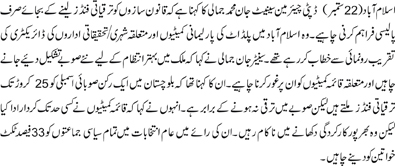
|
|
| |
|
|
| |

|
|
| |
|
|
| |
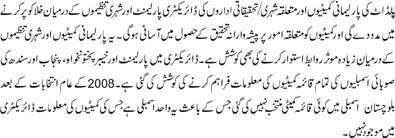
|
|
| |
|
|
| |

|
|
| |
|
|
| |

|
|
| |
|
|
| |

|
|
| |
|
|
| |

|
|
| |
|
|
| |

|
|
| |
|
|
| |

|
|
| |
|
|
| |

|
|
| |
|
|
| |

|
|
| |
|
|
| |
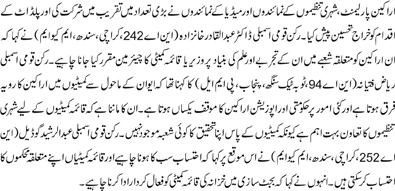
|
|
| |
|
|
| |
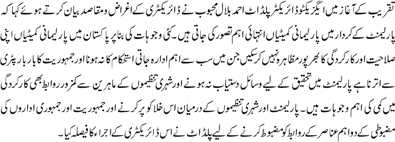
|
|
| |
|
|
| |
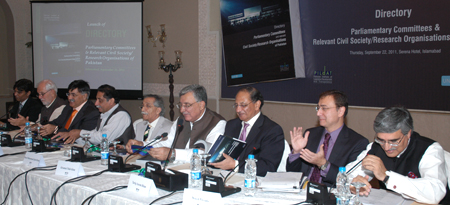
|
|
| |
|
|
| |

|
|
|
|
|
|
|
|
|